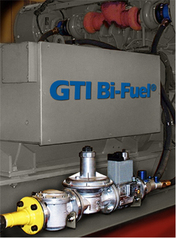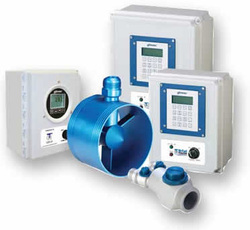Performance

Installation Bi-Fuel System in no way compromises the performance of the generator relative to the rated load of the machine. A generator with a 1000 kW stand-by rating which has been retrofitted to the GTI Bi-Fuel System will still provide 1000 kW of power in both 100% diesel and bi-fuel modes. In other words, the generator is not de-rated after installation of the Bi-Fuel System. Similarly, there is no decrease in generator load response or stability while operating in either fuel mode.
After installation of the GTI Bi-Fuel System hardware, the generator is then operated under various load settings (normally with the use of a resistive load bank)
while the System is checked and calibrated. After this "tune-in" process is completed, the generator is fully tested in bi-fuel mode to assure proper operation of the GTI Bi-Fuel System and generator during light, medium, heavy and transient loads. Finally, the generator is tested in 100% diesel mode to verify that its 100% diesel performance has not been effected by installation of the GTI Bi-Fuel System.
After installation of the GTI Bi-Fuel System hardware, the generator is then operated under various load settings (normally with the use of a resistive load bank)
while the System is checked and calibrated. After this "tune-in" process is completed, the generator is fully tested in bi-fuel mode to assure proper operation of the GTI Bi-Fuel System and generator during light, medium, heavy and transient loads. Finally, the generator is tested in 100% diesel mode to verify that its 100% diesel performance has not been effected by installation of the GTI Bi-Fuel System.
Safety
The patented GTI Bi-Fuel System incorporates a sophisticated, electronic control system, which controls both natural gas and diesel fuel during operation. In addition, the GTI Electronic Control System (ECS) acts as an engine safety device, by monitoring up to 24 critical data channels including:
Exhaust Gas Temperature-Stack
Exhaust Gas Temperature-Cylinder
High engine manifold air pressure
Low natural gas supply pressure
High natural gas supply pressure
High engine vacuum
The various data channels are displayed on the ECS via an LCD display in either text or graphical format. The ECS notifies the user locally (via an LED general fault light) or remotely via modem, in the event of a fault.
If a fault is detected, the ECS will automatically switch the generator to 100% diesel operation and data-log the fault. The ECS fault set points are field adjustable and allow installation technicians to customize the Bi-Fuel System to the specific requirements of the customer and/or the operational limitations set-forth by the engine manufacturer. Once programmed, the fault settings are protected by a keypad lockout code, which prevents unauthorized personnel from altering the set points.
The ECS guarantees that in the unlikely event of either a Bi-Fuel System malfunction, or a disruption in natural gas supply pressure (either low or high pressure faults), the generator drive-engine will be protected from damage. Most of the monitored channels are latching type faults, i.e. if the Bi-Fuel System is deactivated by the ECS, the generator cannot be returned to Bi-Fuel operation until the ECS panel is manually reset. Lastly, the ECS also incorporates a built-in time delay function, which prevents initiation of Bi-Fuel operation after generator start-up, for a period of up to 300 seconds. This feature is used when the converted generator is used in paralleling operations, and allows the generator to start-up and synchronize on 100% diesel fuel before automatically switching to bi-fuel operation.
Exhaust Gas Temperature-Stack
Exhaust Gas Temperature-Cylinder
High engine manifold air pressure
Low natural gas supply pressure
High natural gas supply pressure
High engine vacuum
The various data channels are displayed on the ECS via an LCD display in either text or graphical format. The ECS notifies the user locally (via an LED general fault light) or remotely via modem, in the event of a fault.
If a fault is detected, the ECS will automatically switch the generator to 100% diesel operation and data-log the fault. The ECS fault set points are field adjustable and allow installation technicians to customize the Bi-Fuel System to the specific requirements of the customer and/or the operational limitations set-forth by the engine manufacturer. Once programmed, the fault settings are protected by a keypad lockout code, which prevents unauthorized personnel from altering the set points.
The ECS guarantees that in the unlikely event of either a Bi-Fuel System malfunction, or a disruption in natural gas supply pressure (either low or high pressure faults), the generator drive-engine will be protected from damage. Most of the monitored channels are latching type faults, i.e. if the Bi-Fuel System is deactivated by the ECS, the generator cannot be returned to Bi-Fuel operation until the ECS panel is manually reset. Lastly, the ECS also incorporates a built-in time delay function, which prevents initiation of Bi-Fuel operation after generator start-up, for a period of up to 300 seconds. This feature is used when the converted generator is used in paralleling operations, and allows the generator to start-up and synchronize on 100% diesel fuel before automatically switching to bi-fuel operation.
Savings

The savings realized by running the GTI Bi-Fuel System is directly related to the cost of diesel fuel, cost of gas, and the number of hours of operation. The following is an example is a cost comparison between running a 1000 kW generator on 100% diesel and on Bi-Fuel with a 65% gas-to-diesel ratio in continuous operation. A number of assumptions are made in this example which are clearly stated in order to clarify the calculations.
FACTS AND ASSUMPTIONS | |
| Fuel consumption @ 1000 kW: | 54 gph (100% diesel) |
| Hours per year | 8000 |
| Gas/Diesel ratio | 65% |
| Diesel cost ($/gal) | $3.50 per gallon |
| Natural gas cost ($/mcf) | $11.00 per mcf |
| hhv of #2 diesel | 140,000 btu/gal |
| hhv of natural gas | 1,000 btu/scf |
| Gas Equivalent Gallon (GEG) | 140 scf/gal |
| 100% DIESEL OPERATION | |
| Diesel use per hour | 54 gallons |
| Diesel cost per hour | $189.00 (54 x $3.50) |
| Diesel cost per year | $1,512,000 ($189 x 8000) |
| BI-FUEL OPERATION | |
| Diesel use per hour | 18.9 gph (54 x 0.35) |
| Diesel cost per hour | $66.15 (18.9 x $3.50) |
| Gas use per hour | 4914 scf (54 x 0.65 x 140) |
| Gas cost per hour | $54.05 (4914/1000 x $11.00) |
| Total fuel cost per hour | $120.20 ($66.15 + $54.05) |
| SAVINGS | |
| Bi-Fuel Savings per Hour | $68.80 ($189.00 -$120.20) |
| Bi-Fuel Savings per 8000 hours | $550,368.00 ($68.90 x 8000) |